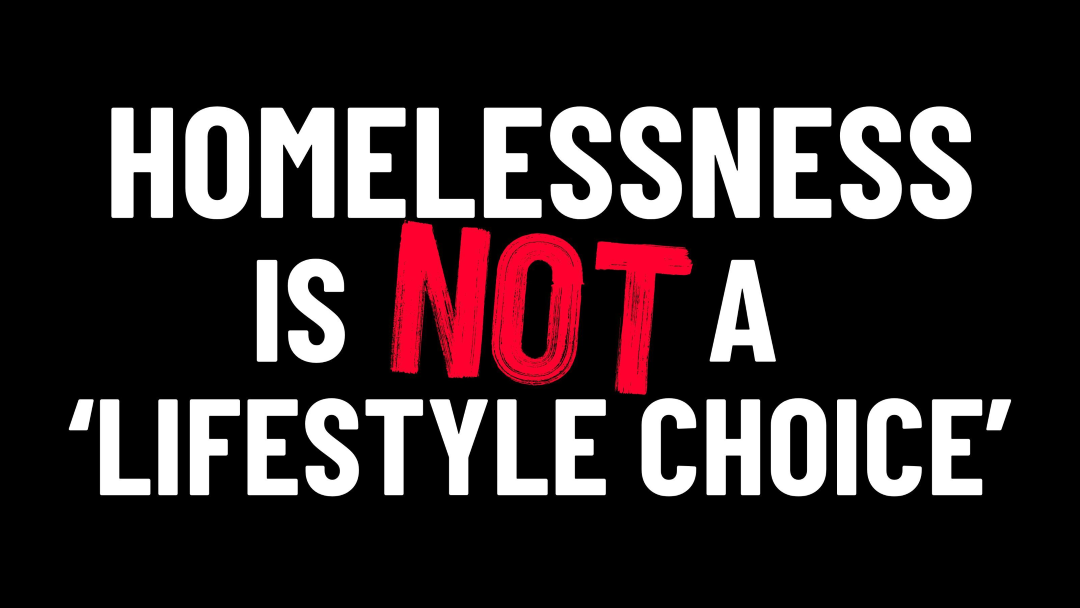Let’s be very clear. Homelessness is not a lifestyle choice.
This is what the home secretary claimed on Saturday when apparently confirming a report that the government intends to introduce legislation criminalising people for being homeless in a tent. The law would also include making it a civil offence for charities to give people tents.
Homelessness is the result of failed government policy
The home secretary claims that ‘there are options for people who don’t want to be sleeping rough’. But there are now scant options to escape homelessness.
There’s an acute shortage of social rent homes. For decades, successive governments have failed to invest in genuinely affordable social homes. Last year – due to policies like Right to Buy – we actually saw a net loss of over 14,000 social rent homes, rather than an increase.
This means people must turn to private renting to escape homelessness. But the government has frozen housing benefit for private renting for over three and a half years. So now, housing benefit rarely covers private rents. It’s supposed to cover the bottom 30% of the local market (itself an austerity measure) but now only covers 5% of advertised lettings in England.
So, the two routes out of homelessness have been choked off by government policy. People who lose their home (often via a no-fault eviction) are unable to access either a social rent home or a private rental. Consequently, we’re seeing record homelessness.
Rough sleeping has risen sharply
The government made an election promise to end rough sleeping by December 2024.
Instead, it’s risen sharply. Government statistics show that last autumn, over 3,000 people were sleeping rough on the streets of England – a rise of 26% in just one year. Since 2010, rough sleeping is up 74%.
The home secretary claims that of those who sleep rough, ‘many of them are from abroad’. In fact, most people (64%) sleeping rough in England are British. They are usually on the streets because, unlike families, they have no ‘priority need’ rights to emergency accommodation. Foreign nationals often end up street homeless because they have ‘no recourse to public funds’. This means no rights to homelessness assistance, emergency accommodation or a means to pay for it, even when they’ve been legally working and paying taxes. It’s unlawful for councils to assist them.
Where foreign nationals are entitled to homelessness assistance, for example, because they’ve been granted refugee status, the Home Office recently moved to give 7-day notices to leave asylum support accommodation. Such a short notice period is doubling council homelessness caseloads in some areas. People with no money need at least 28 days’ notice to leave accommodation or of course, they’ll end up homeless. A council is unlikely to prevent it in seven days.
Being street homeless is the most degrading and inhumane experience. It takes years off people’s lives. Officials statistics show 741 men and women in England and Wales died while homeless in one year (2021). The average age of death is 45 years for men and 43 years for women.
Street homelessness is the tip of the iceberg
Street homelessness is the visible form of homelessness that the public sees.
But a focus on rough sleeping overlooks the vast amount of hidden homelessness. Many, many people are street homeless but too afraid to bed down. They spend the night on public transport, hidden away in disused buildings or woods, or in exploitative situations. Some have to sofa-surf but are conscious they’re overstaying their welcome.
This huge unrecorded need came to light during the government’s ‘Everyone In’ pandemic response when it was clear far more people needed help than those recorded as bedding down on the street.
And there are now record numbers of children (over 130,000) who are homeless with their families, stuck in damaging temporary accommodation, with little hope of getting out into a social or private rented home. It’s common for families to live in one room, sharing beds, for months on end in dangerous, unhealthy conditions. Since 2019, 34 children have died suddenly and unexpectedly while homeless. Some children and young people spend the majority of their childhood homeless in temporary accommodation – an incredibly traumatising experience.
So, what can we do to end homelessness?
We agree with the home secretary that the British people are compassionate. They voted for a government which promised to end rough sleeping.
The government has a great opportunity coming up this month to tackle homelessness: the chancellor’s Autumn Statement.
We urge the chancellor to unfreeze housing benefit in the Autumn Statement and make sure it continues to cover, at the very least, the bottom 30% of local rents. Please email your MP to ask them to get this message to the chancellor.
We urge the government to urgently invest in a new generation of social rent homes, which are genuinely affordable and permanent. These should include specialist and supported homes for people who have health problems and disabilities as a result of being on the street. Please sign our action calling on the next government to make this investment.
And we need your donations. So that we can keep campaigning for genuine solutions to solve homelessness for good, by holding the government to account for its promises. And so we can help the thousands of individuals and families who are homeless on the streets and in temporary accommodation right now. Our advisors and support workers give people facing homelessness hope and help to enforce their rights. Please donate if you can.

